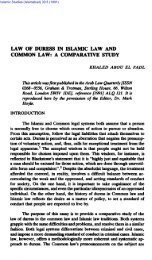MUSLIM EDUCATION IN BENGAL 1837-1937
MUSLIM EDUCATION IN BENGAL 1837-1937
MUSLIM EDUCATION IN BENGAL 1837-1937
Create successful ePaper yourself
Turn your PDF publications into a flip-book with our unique Google optimized e-Paper software.
<strong>MUSLIM</strong> <strong>EDUCATION</strong> 187<br />
tlon. It appears from D.P.I.'s report for 1870-72 that during the previous<br />
five years out d 429 graduates only ten were Muslims.<br />
Causes of Muslim backwardness<br />
16. In Pre-British India a Muslim child started going to School<br />
in the fifth year with Persian as the main language for study. At the<br />
secondary course Arabic was included in the course of study. Education<br />
was free but as the teacher was dependent on the community for necessities<br />
of his life, his economic status was precarious. His social status was<br />
however high. The teaching was generally through lectures with students<br />
sitting on the floor around the teacher. Due to purdah the education of<br />
women was restricted. The wealthier families who could afford made<br />
private arrangement for the education of women.<br />
17. Muslims did not believe in subordinating education to the policies<br />
of Government. The educational institutes were independent of the state<br />
control. Rulers however recognised their resposnibilities in this connexion<br />
and the need of State support. Muslims considered it obligatory to pro-<br />
vide education as a religious act. Religious education was required to be<br />
included in the curriculum as an integral part of Islamic cultural tradition.<br />
Muslim landlords used to entertain teachers at their own cost for the<br />
benefit of the poor children of the neighbourhood and it was rare to find<br />
an opulent person in the village who did not pay for a teacher. But this<br />
class was dwindling even in 1841 when Adam reported on education in<br />
Bengal.<br />
18. "Hindus however followed a different tradition. While the<br />
curriculum in the higher seminaries of learning was largely influenced<br />
by religion, the elementary schools were singularly free from any direct<br />
religious teaching.'%<br />
19. In Bengal, the Baptist Mission founded the Serampur College<br />
with the object of instructing both Christian and non-Christian youths in<br />
western learning. It was the first Missionary College in India. In 1830,<br />
Alexander Duff started Duff College which later became Scottish Churches<br />
College.<br />
20. The system of education introduced by the British overlooked<br />
some of the powerful instincts which guided Muslims in the matter of<br />
education. In Bengal education was conducted through the medium of<br />
sanskritised Bengali by means of Hindu teachers whom Muslims hated.
















